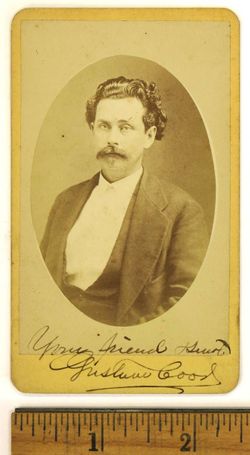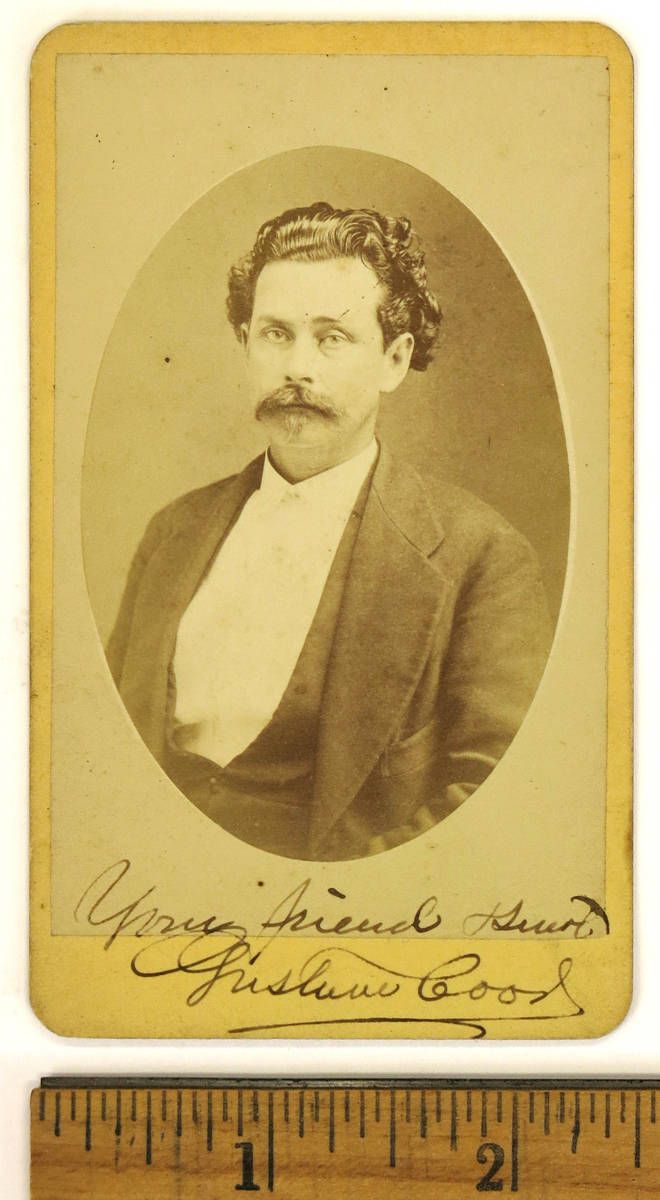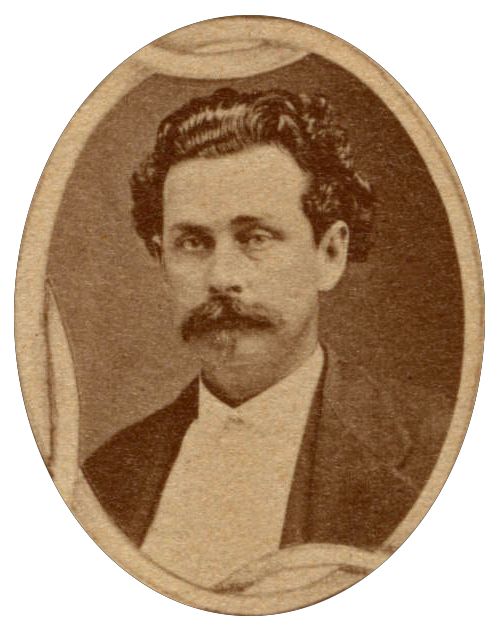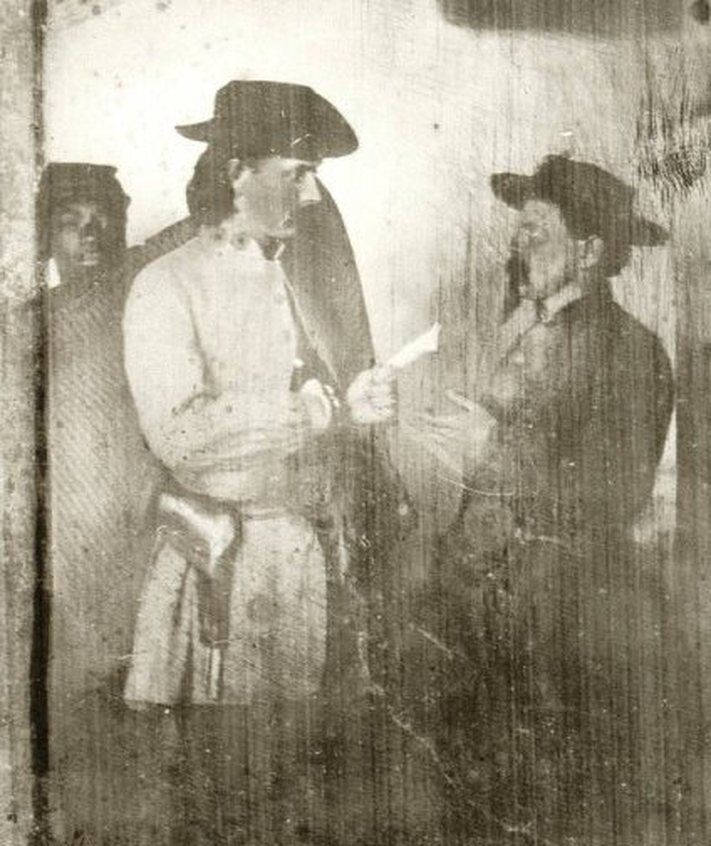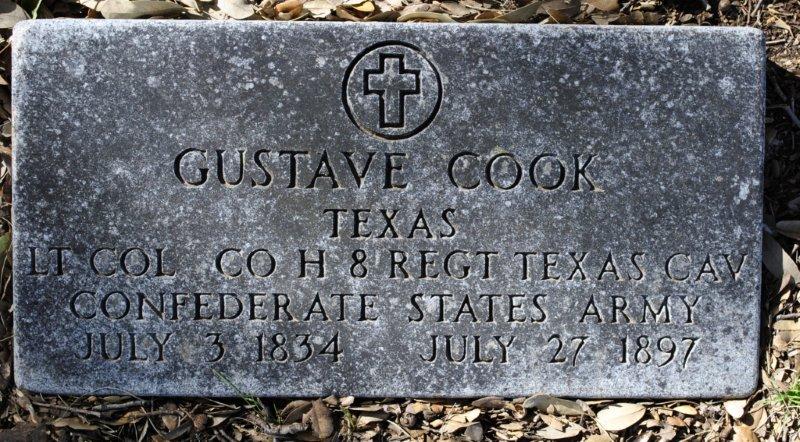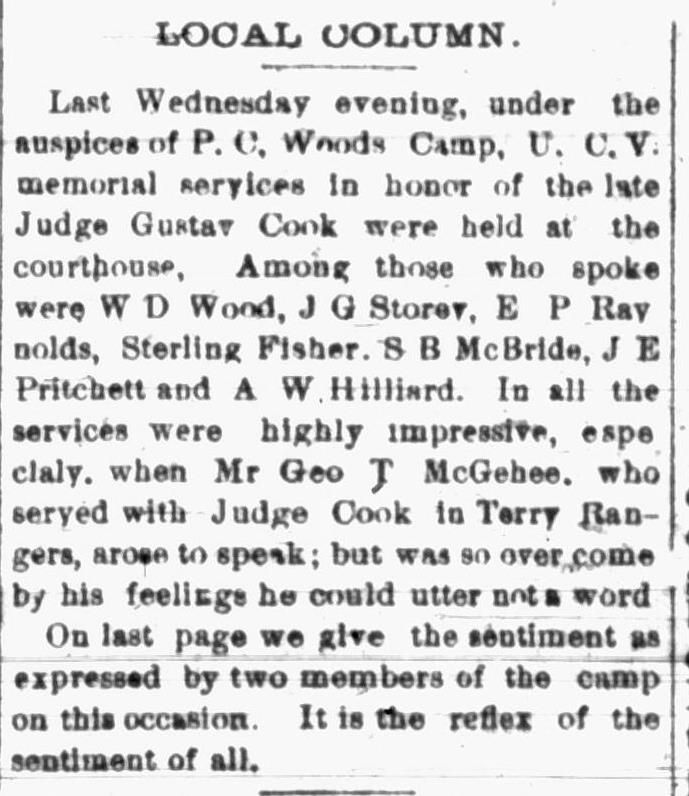HOUSTON.
Gustave Cook was born in Lowndes county, Alabama, July 3, 1835. Nathaniel Cook, his father, was a native of South Carolina, for twenty-five years Judge of the Circuit Court of Alabama, a planter and slave-holder. His mother, Harriet Anthony Herbert, was the daughter of Thomas Herbert and Elizabeth Hampton, of South Carolina. His father and mother were cousins, his paternal grandmother being Ellen Hampton, daughter of Captain Hampton, who figured at King's Mountain, in South Carolina, during the revolution. The family are related to Senator Wade Hampton, by both mother and father; he is related to General Phil. Cook, member of Congress from Georgia, and to Colonel Hillary A. Herbert, member of Congress from Alabama. Walter, his eldest brother, was Captain in a company in the Confederate service, and was killed at Chancellorsville, in 1863. Girard, another brother, now a prominent lawyer in Lowndes county, Alabama, was a Captain in the Confederate army, in General Rhode's Brigade.
Gustave Cook was not a studious boy, and was little inclined either to schools or books. At the age of fifteen he came to Texas, alone, and had neither friend nor acquaintance west of the Mississippi river. His uncle, James R. Cook, was an officer in the Texas war for independence, and was killed in the service in 1836. His uncle's history induced Gustave to gratify his adventurous spirit by visiting the Lone Star State, and his object was to be a soldier. He arrived in the State without money, but soon made acquaintances. Among these were Three Legged Willie, Ben. McCulloch, Lamar, Burnet, Sherman, the Baylors and Burlesons, with whom he became familiar, and whom he adopted as models. He grew up with the pioneer Texans, and imbibed their spirit and daring.
When he first came to Texas, his intention was to take part in some of the numerous revolutions of Mexico, the leaders of which had their resorts along the Rio Grande, on the Texas border. These were lawless convulsions, the true nature of which he, being a youth of fifteen, did not clearly understand. But he sought counsel from those older and wiser than himself, and was soon convinced that they presented no legitimate field for chivalric deeds and heroic achievements; not reluctantly, therefore, he abandoned the idea of joining in these spasmodic upheavals and predatory revolutions.
For two or three years he clerked in a drug store, and became proficient in that line of business. This was the turning point in his life, and from the date of his abandonment of the boyish desire for adventure, he began a life of usefulness which is now crowned with honor. His aspirations since then have been to accomplish something in civil life worthy of his talents and of the relations he sustained to society. How well he has succeeded, this brief biography will show. He has achieved distinction and a high standing in public estimation, without compromising his self-respect.
At the age of eighteen, July 13, 1853, he married Miss Eliza Jones, daughter of Captain Randell Jones, a Texas veteran, of Fort Bend county. She was born in that county, in 1835. Her mother, Mary Andrus, was of a French family who moved from Louisiana to Texas about 1825. Four children were born of this marriage: Ida, born June 20, 1854, was educated at Mobile, and married in Houston, January 27, 1880, to Edwin Kyle, grandson of General Edward Burleson; Mary Herbert, born November 4, 1856, and educated in Houston; Henrietta, born March 13, 1859, educated in Houston; Gustave, born January 24, 1867, destined for fine stock-raising.
After his marriage, Mr. Cook educated himself. The textbooks employed were a spelling book, Colburn's arithmetic, Hedge's Logic, and a Webster's Unabridged Dictionary. His favorite reading was the Spectator, the Federalist, Gibbon's Rome, and Thiers' History of the French Revolution. The favorite poets of the young student were Scott and Burns. Under the advice of friends, he began reading law in 1854, without a preceptor. But Judge John B. Jones kindly directed his legal study, and he was admitted to the bar in 1855, and practiced in the old Austin Colony District until the beginning of the civil war. Before he was twenty-one years of age he was Clerk of the District Court of Fort Bend county for nearly a year. In 1856 he was elected Judge of the County Court of Fort Bend county, and served two years. It was after holding these offices that he began the practice of law as a separate business and sole means of maintenance.
In 1861 he enlisted as a private in the Texas Army, and was under Van Dorn in the capture of Federal troops and stores in this State. In the same year, he became a private in the Eighth Confederate Cavalry, Terry's Texas Rangers. Here he was promoted successively to be Sergeant, Captain, Major, Lieutenant Colonel and Colonel. He joined General Albert Sidney Johnson at Bowling Green, Kentucky, and remained with the Army of Tennessee up to the surrender, in 1865. He was with his regiment in over two hundred engagements; among them Woodsonville, Shiloh, Perryville, Murfreesboro, Chickamauga, Resaca, Marietta, Atlanta, Smithville, N. C., and Bentonville, in the same State. At Shiloh, his right leg was broken by a musket ball; at Farmington, Tennessee, he was shot through the right arm, and received a shot through the right hand that fractured every bone in it, disfiguring, and almost disabling it; at Buckhead Church, Georgia, he was wounded, by a minie ball, through the right ankle, and at Bentonville he was shot through the right shoulder, the ball lodging in the rear of the lung. He received six or seven wounds during the war, and the scars he wears tell a tale of courage and gallantry and heroism far more eloquent than the praise of his biographer. He had voted for secession, and he offered his life to secure it.
When Colonel Cook reached home, at the close of the conflict, in 1865, he was a mere wreck, weighing only 118 pounds. Broken down in health, he was also bleeding from his wounds every hour in the day. Nor was this all: he was ruined in fortune and involved in an enormous debt, and he immediately prepared to retrieve the one and discharge the other, though the latter alone required fourteen years.
Colonel Cook resumed the practice of law at his old home, and continued there until his removal to Houston, in 1870, where he has since resided. In 1872 he was elected a member of the Thirteenth Legislature of Texas. He has been a delegate from Harris county to every Democratic State Convention up to the time of his assuming the duties of judge.
In 1874 he was, by Governor Coke, appointed Judge of the Criminal Court for the District of Galveston and Harris counties, which position, by re-appointment of Governor Hubbard, he held till October 1, 1888, when he tendered his resignation, and it was accepted. He was a delegate to the Democratic State Convention at Galveston, in 1876, and opposed any action on the part of the Convention looking to the endorsement of the Constitution then about to be submitted to the people. He was delegate from Texas to the Philadelphia Peace Convention, in 1866. In politics, he has always been a Democrat of the State's Rights school, voted for secession, and favored the reconstruction policy of President Johnson. In the Legislature, he opposed the land grant to the Texas & Pacific Railway Company.
During his incumbency as Judge of the Criminal District Court of Galveston and Harris counties, the great excitement in labor circles throughout the United States occurred. Judge Cook conceived it to be in the line of his duty, as preserver of the public peace, to make some expressive declarations upon this subject, which he did in the public press of his district. These expressions were clear, distinct and severe, one might say even to harshness, but he considered them necessary to attract the attention of the people, who seemed to be laboring under the most intense excitement, and were, as he believed, being misled by charlatans and demagogues very rapidly towards their destruction, as well as towards the serious injury of the country. He did not hesitate to speak out openly, and warn those interested against the dangers, which he saw impending to them and the country. This drew down upon him a torrent of abuse and malediction, even to the extent of ominous and frequent expressions to the effect that "such a man should not be permitted to live," and the like, manifestly intended to excite violence towards him upon the part of those who considered themselves aggrieved by his interference.
All this he bore with much fortitude, and held to the line of duty, as he conceived it. Subsequent events have convinced those who considered themselves so grievously wronged that their good, as well as the good of the whole country, could be best accomplished by following the course he pursued; and it is to be hoped that they have realized that cauterization was the best treatment for the prevention of the consequences which might have attended the further prosecution of their plan of operation. The working classes have no truer friend than Judge Cook.
In 1887, upon the urgent solicitation of the Executive Committee of the anti-prohibition organization, Judge Cook took the stump in opposition to the proposed amendment to the Constitution prohibiting the manufacture and sale of spirituous, vinous and malt liquors in Texas. In pursuance of the programme, which they laid down, he canvassed a great portion of the State, traveling about 2,500 miles, making forty-odd speeches, varying in length from an hour and three-quarters to two hours and a half, in fifty-six days. There is no doubt that this active and powerful agency was largely instrumental in bringing about the result.
During the campaign of 1888, at the request of the committee, Judge Cook assisted in the campaign towards the re-election of Hon. Roger Q. Mills to Congress, and made eight or ten speeches in his district. With these exceptions, he has not departed from the even tenor of his way since 1881 until his resignation as judge in 1888, since which time he has confined himself to the practice of his profession and to his family.
Judge Cook is a member of the Episcopal Church, with a decided tendency to the Catholic faith, which his wife and two children have embraced. His eventful life and his frequent and almost miraculous escapes from death have attracted his attention to his relation to his Deity, and the dispensations of Providence towards him. He makes no concealment of his devout gratitude to God for past preservation and present prosperity. The controlling principle of his life has been to do justice, love mercy, and walk humbly before God. From his mother, a woman of exquisite beauty, both of person and character, he learned to value truth and hate deceit. She taught him his religious duty, which he has never neglected, He is a devout and just man in every relation of life. He is also a Royal Arch Mason, and honors and practices the rules of the Order. As an orator, he has but few equals in Texas; and as a jurist, no superior. His legal opinions are eagerly sought, and highly prized. His charges to juries are brief, concise, clear, and embrace the legal points on which they are to decide. Dignity, uprightness and absolute justice characterize his actions on the bench.
In social life, he is very approachable, courtesy and affability being leading features of his admirable character. As an evidence of his legal learning and acumen, it can be truthfully said that his decisions are always sustained and his judgments affirmed by the Court of Appeals, when appeals have been prosecuted. Since his appointment, in 1874, but three of his cases have been reversed on appeal, and each of these on minor technical grounds. His knowledge is very extensive, and his friends call him a living encyclopedia.
Judge Cook is not in the least avaricious. His opportunities to amass wealth have been excellent, but his boundless generosity and indifference to the accumulation of riches have prevented him from becoming wealthy. He regards property as a trust by the Creator, to be used in the relief of distress and in making others comfortable, rather than in the gratification of his own tastes and wants. His daughter, Miss Henrietta, is the financier of the family, managing the home business and directing the expenditures. He has a handsome cottage residence in Houston, and a summer home in San Marcos, and besides ownsseveral thousand acres of unimproved land in Brown, Nueces and Hays counties.
Judge Cook is justly regarded by his friends as a model of propriety, and as an honorable, useful and meritorious member of society. Source: Texas Genealogy Trails website
HOUSTON.
Gustave Cook was born in Lowndes county, Alabama, July 3, 1835. Nathaniel Cook, his father, was a native of South Carolina, for twenty-five years Judge of the Circuit Court of Alabama, a planter and slave-holder. His mother, Harriet Anthony Herbert, was the daughter of Thomas Herbert and Elizabeth Hampton, of South Carolina. His father and mother were cousins, his paternal grandmother being Ellen Hampton, daughter of Captain Hampton, who figured at King's Mountain, in South Carolina, during the revolution. The family are related to Senator Wade Hampton, by both mother and father; he is related to General Phil. Cook, member of Congress from Georgia, and to Colonel Hillary A. Herbert, member of Congress from Alabama. Walter, his eldest brother, was Captain in a company in the Confederate service, and was killed at Chancellorsville, in 1863. Girard, another brother, now a prominent lawyer in Lowndes county, Alabama, was a Captain in the Confederate army, in General Rhode's Brigade.
Gustave Cook was not a studious boy, and was little inclined either to schools or books. At the age of fifteen he came to Texas, alone, and had neither friend nor acquaintance west of the Mississippi river. His uncle, James R. Cook, was an officer in the Texas war for independence, and was killed in the service in 1836. His uncle's history induced Gustave to gratify his adventurous spirit by visiting the Lone Star State, and his object was to be a soldier. He arrived in the State without money, but soon made acquaintances. Among these were Three Legged Willie, Ben. McCulloch, Lamar, Burnet, Sherman, the Baylors and Burlesons, with whom he became familiar, and whom he adopted as models. He grew up with the pioneer Texans, and imbibed their spirit and daring.
When he first came to Texas, his intention was to take part in some of the numerous revolutions of Mexico, the leaders of which had their resorts along the Rio Grande, on the Texas border. These were lawless convulsions, the true nature of which he, being a youth of fifteen, did not clearly understand. But he sought counsel from those older and wiser than himself, and was soon convinced that they presented no legitimate field for chivalric deeds and heroic achievements; not reluctantly, therefore, he abandoned the idea of joining in these spasmodic upheavals and predatory revolutions.
For two or three years he clerked in a drug store, and became proficient in that line of business. This was the turning point in his life, and from the date of his abandonment of the boyish desire for adventure, he began a life of usefulness which is now crowned with honor. His aspirations since then have been to accomplish something in civil life worthy of his talents and of the relations he sustained to society. How well he has succeeded, this brief biography will show. He has achieved distinction and a high standing in public estimation, without compromising his self-respect.
At the age of eighteen, July 13, 1853, he married Miss Eliza Jones, daughter of Captain Randell Jones, a Texas veteran, of Fort Bend county. She was born in that county, in 1835. Her mother, Mary Andrus, was of a French family who moved from Louisiana to Texas about 1825. Four children were born of this marriage: Ida, born June 20, 1854, was educated at Mobile, and married in Houston, January 27, 1880, to Edwin Kyle, grandson of General Edward Burleson; Mary Herbert, born November 4, 1856, and educated in Houston; Henrietta, born March 13, 1859, educated in Houston; Gustave, born January 24, 1867, destined for fine stock-raising.
After his marriage, Mr. Cook educated himself. The textbooks employed were a spelling book, Colburn's arithmetic, Hedge's Logic, and a Webster's Unabridged Dictionary. His favorite reading was the Spectator, the Federalist, Gibbon's Rome, and Thiers' History of the French Revolution. The favorite poets of the young student were Scott and Burns. Under the advice of friends, he began reading law in 1854, without a preceptor. But Judge John B. Jones kindly directed his legal study, and he was admitted to the bar in 1855, and practiced in the old Austin Colony District until the beginning of the civil war. Before he was twenty-one years of age he was Clerk of the District Court of Fort Bend county for nearly a year. In 1856 he was elected Judge of the County Court of Fort Bend county, and served two years. It was after holding these offices that he began the practice of law as a separate business and sole means of maintenance.
In 1861 he enlisted as a private in the Texas Army, and was under Van Dorn in the capture of Federal troops and stores in this State. In the same year, he became a private in the Eighth Confederate Cavalry, Terry's Texas Rangers. Here he was promoted successively to be Sergeant, Captain, Major, Lieutenant Colonel and Colonel. He joined General Albert Sidney Johnson at Bowling Green, Kentucky, and remained with the Army of Tennessee up to the surrender, in 1865. He was with his regiment in over two hundred engagements; among them Woodsonville, Shiloh, Perryville, Murfreesboro, Chickamauga, Resaca, Marietta, Atlanta, Smithville, N. C., and Bentonville, in the same State. At Shiloh, his right leg was broken by a musket ball; at Farmington, Tennessee, he was shot through the right arm, and received a shot through the right hand that fractured every bone in it, disfiguring, and almost disabling it; at Buckhead Church, Georgia, he was wounded, by a minie ball, through the right ankle, and at Bentonville he was shot through the right shoulder, the ball lodging in the rear of the lung. He received six or seven wounds during the war, and the scars he wears tell a tale of courage and gallantry and heroism far more eloquent than the praise of his biographer. He had voted for secession, and he offered his life to secure it.
When Colonel Cook reached home, at the close of the conflict, in 1865, he was a mere wreck, weighing only 118 pounds. Broken down in health, he was also bleeding from his wounds every hour in the day. Nor was this all: he was ruined in fortune and involved in an enormous debt, and he immediately prepared to retrieve the one and discharge the other, though the latter alone required fourteen years.
Colonel Cook resumed the practice of law at his old home, and continued there until his removal to Houston, in 1870, where he has since resided. In 1872 he was elected a member of the Thirteenth Legislature of Texas. He has been a delegate from Harris county to every Democratic State Convention up to the time of his assuming the duties of judge.
In 1874 he was, by Governor Coke, appointed Judge of the Criminal Court for the District of Galveston and Harris counties, which position, by re-appointment of Governor Hubbard, he held till October 1, 1888, when he tendered his resignation, and it was accepted. He was a delegate to the Democratic State Convention at Galveston, in 1876, and opposed any action on the part of the Convention looking to the endorsement of the Constitution then about to be submitted to the people. He was delegate from Texas to the Philadelphia Peace Convention, in 1866. In politics, he has always been a Democrat of the State's Rights school, voted for secession, and favored the reconstruction policy of President Johnson. In the Legislature, he opposed the land grant to the Texas & Pacific Railway Company.
During his incumbency as Judge of the Criminal District Court of Galveston and Harris counties, the great excitement in labor circles throughout the United States occurred. Judge Cook conceived it to be in the line of his duty, as preserver of the public peace, to make some expressive declarations upon this subject, which he did in the public press of his district. These expressions were clear, distinct and severe, one might say even to harshness, but he considered them necessary to attract the attention of the people, who seemed to be laboring under the most intense excitement, and were, as he believed, being misled by charlatans and demagogues very rapidly towards their destruction, as well as towards the serious injury of the country. He did not hesitate to speak out openly, and warn those interested against the dangers, which he saw impending to them and the country. This drew down upon him a torrent of abuse and malediction, even to the extent of ominous and frequent expressions to the effect that "such a man should not be permitted to live," and the like, manifestly intended to excite violence towards him upon the part of those who considered themselves aggrieved by his interference.
All this he bore with much fortitude, and held to the line of duty, as he conceived it. Subsequent events have convinced those who considered themselves so grievously wronged that their good, as well as the good of the whole country, could be best accomplished by following the course he pursued; and it is to be hoped that they have realized that cauterization was the best treatment for the prevention of the consequences which might have attended the further prosecution of their plan of operation. The working classes have no truer friend than Judge Cook.
In 1887, upon the urgent solicitation of the Executive Committee of the anti-prohibition organization, Judge Cook took the stump in opposition to the proposed amendment to the Constitution prohibiting the manufacture and sale of spirituous, vinous and malt liquors in Texas. In pursuance of the programme, which they laid down, he canvassed a great portion of the State, traveling about 2,500 miles, making forty-odd speeches, varying in length from an hour and three-quarters to two hours and a half, in fifty-six days. There is no doubt that this active and powerful agency was largely instrumental in bringing about the result.
During the campaign of 1888, at the request of the committee, Judge Cook assisted in the campaign towards the re-election of Hon. Roger Q. Mills to Congress, and made eight or ten speeches in his district. With these exceptions, he has not departed from the even tenor of his way since 1881 until his resignation as judge in 1888, since which time he has confined himself to the practice of his profession and to his family.
Judge Cook is a member of the Episcopal Church, with a decided tendency to the Catholic faith, which his wife and two children have embraced. His eventful life and his frequent and almost miraculous escapes from death have attracted his attention to his relation to his Deity, and the dispensations of Providence towards him. He makes no concealment of his devout gratitude to God for past preservation and present prosperity. The controlling principle of his life has been to do justice, love mercy, and walk humbly before God. From his mother, a woman of exquisite beauty, both of person and character, he learned to value truth and hate deceit. She taught him his religious duty, which he has never neglected, He is a devout and just man in every relation of life. He is also a Royal Arch Mason, and honors and practices the rules of the Order. As an orator, he has but few equals in Texas; and as a jurist, no superior. His legal opinions are eagerly sought, and highly prized. His charges to juries are brief, concise, clear, and embrace the legal points on which they are to decide. Dignity, uprightness and absolute justice characterize his actions on the bench.
In social life, he is very approachable, courtesy and affability being leading features of his admirable character. As an evidence of his legal learning and acumen, it can be truthfully said that his decisions are always sustained and his judgments affirmed by the Court of Appeals, when appeals have been prosecuted. Since his appointment, in 1874, but three of his cases have been reversed on appeal, and each of these on minor technical grounds. His knowledge is very extensive, and his friends call him a living encyclopedia.
Judge Cook is not in the least avaricious. His opportunities to amass wealth have been excellent, but his boundless generosity and indifference to the accumulation of riches have prevented him from becoming wealthy. He regards property as a trust by the Creator, to be used in the relief of distress and in making others comfortable, rather than in the gratification of his own tastes and wants. His daughter, Miss Henrietta, is the financier of the family, managing the home business and directing the expenditures. He has a handsome cottage residence in Houston, and a summer home in San Marcos, and besides ownsseveral thousand acres of unimproved land in Brown, Nueces and Hays counties.
Judge Cook is justly regarded by his friends as a model of propriety, and as an honorable, useful and meritorious member of society. Source: Texas Genealogy Trails website
Gravesite Details
Note: There's a conflict in the cemetery database regarding plot locations for Sections Old Original B & Q.
Family Members
Advertisement
Explore more
Sponsored by Ancestry
Advertisement
